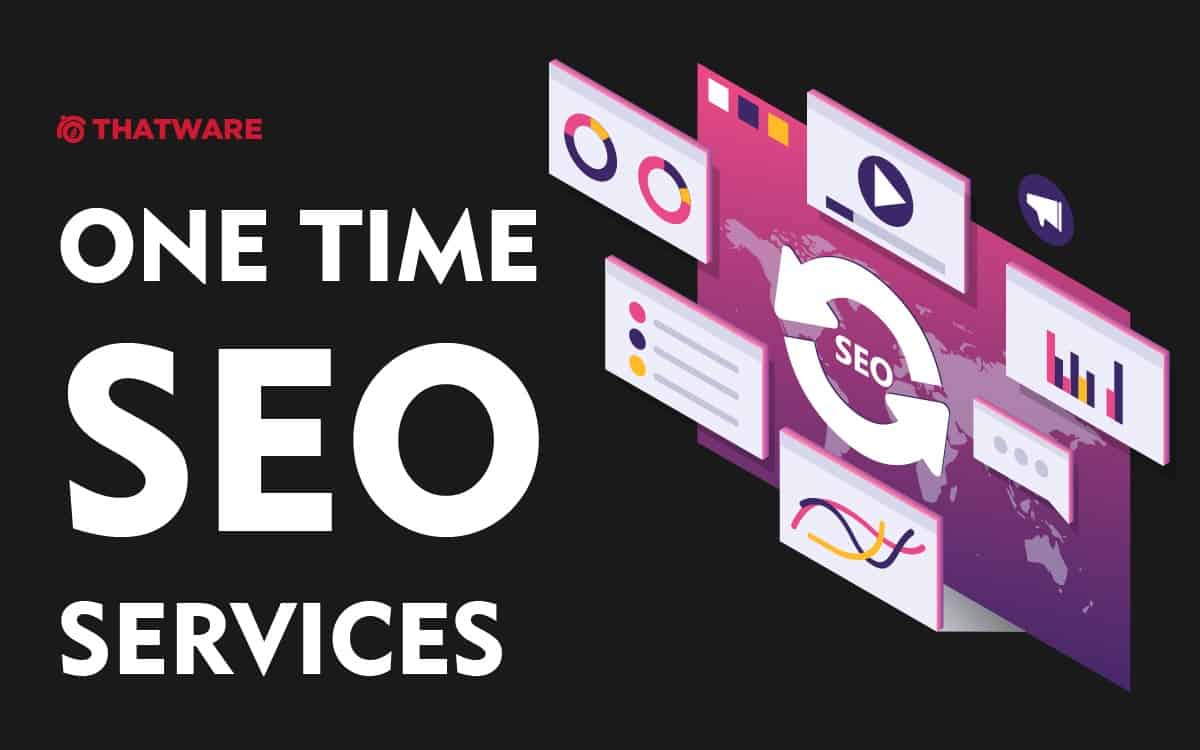GET A FREE CUSTOMIZED SEO AUDIT & DIGITAL MARKETING STRATEGY FOR YOUR FINANCIAL BUSINESS
In the fast-evolving landscape of the financial industry, staying ahead of the curve is not just a desire; it’s a necessity. With the digital realm becoming increasingly integral to financial services, a robust online presence is critical for success. Let’s delve into the world of seo for financial services along with the specialization of ThatWare.
ThatWare, a trailblazer in the realm of digital marketing, proudly introduces its specialized accounting SEO services tailored explicitly for the financial sector.
Understanding the Landscape:
The financial industry operates in a highly competitive and regulated environment. From banking and insurance to investment and fintech, businesses in this sector face unique challenges in establishing and maintaining a strong digital presence. ThatWare recognizes the nuances of this landscape and, with years of expertise, has crafted a suite of SEO for bookkeepers services designed to address the distinct needs of financial institutions.
SEO for financial services stands for search engine optimization, and the financial SEO description refers to the method of modifying your financial website’s code and content to help search engine crawlers better comprehend what your pages are rough. The better search crawlers can discern your page, the more relations they’ll bring between it and pertained search questions, thus directing to higher rankings. There are more than 200 components that affect a page’s indexing, but the ones that count sizably are:
1. Whether or not your website is secure (HTTPS vs. HTTP)
2. Whether or not your website is mobile-friendly
3. How fast web pages load on your site
4. Whether a web page has the correct schema markup (a type of website code)
5. The quality of your web pages’ content
6. The length of your web pages’ content
7. Presence of social signals that point back to your website
8. Existence of quality backlinks that point back to your website
9. Whether or not you have optimized images on your web pages
10. Earlier user behaviour for similar queries aka Google’s Rank Brain
How do you impact all these factors? The tips below covered all these ranking factors and if fulfilled right should increase your web pages’ SEO score.
SEO FOR FINANCE: TIPS PROVEN TO INCREASE RANKINGS, LEADS, AND NEW CLIENTS
There are two camps when it arrives at SEO for financial advisors:
1. Those advisors who think it doesn’t matter much as an advisor or financial firm’s business is and will proceed to be referral-based
2. Those advisors who think that while referrals are a great source of leads, advisors shouldn’t have to bank on them as the only origin of business since the financial services industry is rapidly changing to the online space.
Those consultants and companies in the second camp are the ones that will beat their opponents and come out at the height of the search results. Yes, referrals are a big source of new business for monetary advisors and one of the decent drivers of new leads will give the first camp that. That’s why one of your online marketing techniques should be review and acknowledgement generation, but not your only strategy.
First, there are already more than 700,000 only US-based online searches for wealth management and financial advisor-related specific keywords per month, and more than 90,000 U.S.-based searches for the word financial advisor alone. Second, recent research from Deloitte found millennials prefer to do their own research when it arrives at wealth management, and the place they go to do it is the exact place the majority of the public goes when they require to research something like a search engine like Google. And how do you get your website to the prime of the Google search engine results page?
With search engine optimization aka SEO. When it gets to SEO, finance is a unique beast than other enterprises. Below you’ll find a guide to assist you to achieve financial services SEO also the tips provided are proven to make your financial website rank higher in search results, persuade more leads, and intimidate more new customers.
1. Make your website mobile-friendly, fast, and secure
2. Utilize past search behaviour to discover top SEO keyword research for financial advisors.
3. Optimize your website’s content, title tags, headings, and meta descriptions for your top keywords
4. Claim and entirely fill out your Google My Business profile
5. Assert and fill out your local directory listings with the exact same business information
6. Build a key-phrase-optimized blog with high-quality content, and update it regularly
7. Seize the advantage of SEO-optimized photos and videos
SEO TIP 1 :
Three statistics sum up why website speed, mobile optimization, and safety are ranking factors:
47 percent of people expect a web page to pile up in 2 seconds or less and will quit if it takes longer Customers now waste further than five hours a day on their smartphones, and 57 percent of all U.S. online traffic now comes from mobiles and tablets. There is a cyber-attack every 39 seconds and 43 percent of cyber-attacks target tiny businesses. No, that amounts it up.
SEO TIP 2 :
Utilize Past Search Behavior to find the perfect keywords. Google created its existing algorithm around Rank Brain, a machine learning (AI) algorithm Google utilizes to assist groups and enhance search results. Backlinko thickened it pretty well. Therefore, Rank Brain handles the algorithm in its own way. Banking on the keyword, Rank Brain will increase or decrease the significance of backlinks, content freshness, content length, domain authority or DA, etc. Then, it glances at how Google searchers interact with modern search outcomes. If users like the fresh algorithm better, it stays. If not, Rank Brain goes back to the former algorithm.
If you haven’t partnered with any SEO agency for financial services for analysis, you can use software like Blue Corona utilizes for our financial client, you can assemble a keyword and content plan by seizing cues from Rank Brain’s past search behaviour by analyzing two sections on the Google search results page, the “people also ask” section, and the “keywords related to” section. If you like to go a stride further, you can utilize software like Google Ads’ Keyword Planner, or the free equipment Keywords Everywhere.
SEO TIP 3 :
Optimize all Titles, Headings and Description for Keywords Optimization. Much like you browse the headings of news articles to get the substance of what the content is about, search crawlers examine the titles, headings, and descriptions of your pages. Make certain each page has titles and headings that comprise your top key phrases and are descriptive of the content (no keyword stuffing). Ample content management systems like WordPress have plugins or the ability to add these in the backend, but if you’re perplexed, ask your webmaster.
SEO TIP 4 :
Claim and Optimize your Google My Business Page. One thing you’re going to expect is local SEO. Finance firms that want additional local business expect to get in the local pack opportunities which are, you’ve seen that pack of local map listings in the search outcomes. Those local listings arrive from a business’s Google My Business Page. Google My Business or GMB is your nicest bet to get your firm documented on Google Maps for local searches, banking on your location and the competitive terrain for your area. Google utilizes the data on your Google My Business page to exhibit your firm’s:
• Phone number
• Address
• Business hours
• Average reviews
• Specials, coupons, and updates
To optimize your Google My Business page, pursue these steps :
a. Choose the appropriate business categories on GMB.
b. Compose a long (200–300 words), keyword-rich description for your business.
c. Involve the correct NAP information (Name, Address, Phone number).
d. Put a link to your website
e. Link your social media and online review profiles
f. Put in photos. Lots and lots of photos.
SEO TIP 5 :
Complete all directories and social media listings. Google yanks local information from all of your directory listings, comprising ones you may not know exist. I propose finding and declaring or creating all of your online profiles comprising the ones at:
• yellowpages.com
• yelp.com
• wallethub.com
• wealthmanagement.com
• insidermedia.com
• financialservicedirectory.com
• wiseradvisor.com
• cpadirectory.com
• linkedin.com
SEO TIP 6 :
Create Quality Blogs Regularly. Not only does possessing a blog to boost your chances of ranking on search engines by 434 per cent, but it also enhances user affairs. According to Forbes, about 60 per cent of Baby Boomers spend time examining blogs and online articles as an origin of data and conspiracy, and about 70 per cent enjoy seeing videos about products and services. Digital Trends also found that Baby Boomers are 19 per cent more likely to distribute content compared to any other generation.
HIGH-QUALITY CONTENT+FINANCIAL INDUSTRY= HIGHER RANKINGS
Google glances at some websites and web pages with a higher level of scrutiny because of their potential to affect a person’s well-being and prosperity. These pages are named YMYL, or Your Money, Your Life pages. Any web pages that retain to do with financial advice or wealth management qualify as YMYL pages and are accordingly difficult to rank well. This is particularly true after an August 2018 Google algorithm updated by the Google Medic update which drastically influenced the financial industry’s search rankings.
Here’s how Google interprets quality content, as summarized by its Search Quality Guidelines:
1. Most pages primarily for users, not for search engines
2. Don’t mislead your users
3. Avoid tricks intended to enhance search engine rankings.
A nice rule of thumb is whether you’d sense comfortable explaining what you’ve done to a Google employee. An additional helpful test is to ask, Does this help my users? Would I do this if search engines didn’t prevail? Believe in what makes your website unique, important, or engaging. Make your website shelf out from others in your field.
Avoid the following techniques:
• Automatically generated content
• Contributing to link schemes
• Building pages with little or no original content
• Cloaking
• Tricky redirects
• Hidden text or links
• Doorway pages
• Scraped content
• Contributing in affiliate programs without adding sufficient value
• Loading pages with irrelevant keywords
•Establishing pages with malicious behaviour, such as phishing or installing viruses, trojans, or other badware.
• Abusing rich snippets markup
• Mailing automated queries to Google
And to add pursue good practices like these:
1. Monitoring your site for hacking and discarding hacked content as soon as it appears
2. Preventing and eliminating user-generated spam on your site
SEO TIP 7:
Take benefit of optimized images and videos. Images boost a user’s experience on your website, but search crawlers can’t certainly see images and videos, so they rely on extra bits of information to comprehend what an image is about. Make certain that you optimize the following:
• Image alt tag
• Image filename
• Image title
• Image description
SEO with ‘EAT’ Content
Content is king, particularly in financial services marketing, where brand credibility and presumed reputation are crucial.
SEO for finance firms is especially dependent on high-quality content – just providing content isn’t enough. Businesses should strive for EAT content (Expert, Authoritative, and Trustworthy). There is no precise description of EAT friendly content for Google – but their search quality evaluator recommendations have advice about what content is good for SEO.
Expert, authoritative, and trustworthy content is not only better for search results, but it can also help boost brand credibility, and it can help drive visitors across the funnel toward conversion while the customer’s end target is in mind. This concept is defined by Google as “needs met,” where high-quality content can be described as fulfilling the needs of users based on their “search intent” and getting them where they want to go.
When it comes to SEO for finance companies and FSI websites, content is especially relevant because websites tend to be smaller and have fewer landing pages. Otherwise, blog posts, information sites, multi-media material, news releases, and white papers will help bring in valuable organic traffic. In truth, these are often the most critical.
EAT should be the primary target for nav-bar websites, guide pages, and long-form blogs in order to maximise user loyalty and raise shares.
Building on the foundation of EAT (Expert, Authoritative, Trustworthy) content, effective SEO for financial businesses requires a strategic approach to engage users and build trust. Financial websites must prioritize content that not only ranks well but also resonates with clients seeking reliable advice. This means crafting resources like in-depth guides, case studies, and FAQs that address specific financial concerns, such as retirement planning or investment options. By aligning content with user intent, businesses can guide visitors seamlessly from discovery to decision-making.
Mobile optimization is critical for financial SEO, as many users research services on their phones. Fast-loading pages, clear calls-to-action, and intuitive navigation ensure a smooth experience. For example, a mortgage calculator or a “contact an advisor” button optimized for mobile can drive conversions. Local SEO also plays a key role for firms targeting nearby clients. Optimizing for searches like “financial planner near me” with location-specific pages and Google Business Profile updates boosts visibility.
Backlinks from reputable financial sites, such as industry publications or regulatory bodies, enhance authority and signal trust to search engines. Regularly updating content, like blog posts on market trends or tax tips, keeps your site fresh and relevant. Multimedia, such as explainer videos or infographics, can make complex financial topics accessible, encouraging longer site visits and higher engagement.
Technical SEO is equally vital. Secure websites (HTTPS), fast load times, and structured data markup help search engines understand your content. For instance, schema for financial services can highlight reviews or fees, improving click-through rates. By combining EAT-focused content, mobile-friendly design, and strong technical SEO, financial businesses can attract organic traffic, build credibility, and convert visitors into loyal clients. Start with a tailored SEO strategy to stand out in this competitive industry.
Google’s webmaster instructions for content
Finance-related content SEO should adhere to Google’s webmaster rules as well. Their recommendations are essential for recognising what constitutes good search material, as well as warnings about what types of bad practices will result in penalties.
- Create content that is specifically intended for consumers rather than search engines. Again, the right content will assist the clients in getting to where they want to go and, ideally, guiding them toward conversion.
- Avoid tactics designed to boost search engine rankings. A simple rule of thumb is if you’d be better at describing what you’ve done to a competitor’s website or a Google employee. Another good litmus test is to ask yourself, “Does this benefit my users?” Will I do this if there were no search engines?”
- Consider what makes the platform or material distinct, meaningful, or engaging. SEO for financial firms, in particular, entails making the website stand out from rivals.
Inbound marketing and blogs
Many seasoned marketers regard information content/blogs as distinct targeting types in and of themselves. 70% of advertisers are engaging in content marketing, with almost a quarter wanting to increase their content marketing output.
Blogs are one of the most effective ways to drive traffic to your website. As part of financial services marketing, blogs/info posts can be built on long-tail and precise keywords from the keyword research testing process – and when mixed with terms like “EAT” and “search intent,” brands will produce high-quality, educational, and comprehensive content.
They are also one of the easiest places to do “inbound SEO,” which is selling to people who are already involved in your brand’s services/content and only need a simple way to find it. This can imply a finance SEO approach with higher conversions and ROI.
Here are some examples of how blogs can assist with search traffic:
- Blogs that clarify and describe FSI terminology;
- Guides to assist customers with tax implications; and
- Which types of services work better for individuals and which work best for B2B businesses.
- Providing answers to frequently asked questions about procedures, records, industry, savings, investments, and other topics.
- How to open accounts, close accounts, move money, and so forth.
- Assisting them in determining what kind of service they need and with what particular goals.
- Including explanations for breaking news and business incidents, etc.
Request keywords on these subjects are an excellent way to generate “inbound” awareness by relying on searchers with the specific intent on topics relevant to your brand.
What exactly is YMYL, and why is it so significant?
Understanding YMYL is critical for finance SEO. YMYL is a Google search term that refers to blogs on “your money or your life.”
This includes websites that are highly focused on issues such as people’s well-being, economics, fitness, safety, and so on. SEO for YMYL websites is particularly relevant in FSI marketing since it refers to financial sector topics such as trading, lending, finance-legalities/taxation, certifications, and so on.
While there is no clear algorithm “score signal” for YMYL, the search engine’s algorithm will handle particular topics differently if it knows they are finance-related – this with the intention of ensuring searchers see only the most reliable and truthful results in the search results list (SERP).
If Google wishes to categorise your site as YMYL, quality, consistency, authority, and freshness become much more relevant for financial search marketing.
This is why companies and firms that fall under the category of “YMYL” should concentrate on relevant SEO best practices for finance SEO:
- Avoid “thin content,” or lazy, low-effort content that can be penalised or rated lower in search results.
- Ensure that the content is designed to have the best possible user experience – make it understandable, truthful, and reliable (like EAT content). Content that is deceptive in order to monetize or drive sales will backfire.
- Ensure that relevant business material and official information is up to date; Google’s freshness algorithm upgrade has an effect on certain YMYL topics in SEO.
- Avoid intrusive commercials such as interstitial ads and “top-heavy” ads, which have been condemned by Google.
At ThatWare, we recognize the distinct needs of the financial sector and pledge to tailor our SEO approach accordingly. Our goal extends beyond merely boosting search engine visibility; we aim to position your brand as a trusted authority in the digital realm. Our services are meticulously designed to adhere to industry standards and regulations while delivering tangible results.
Our comprehensive finance seo services encompass various tactics, from keyword optimization to content creation. We prioritize technical SEO, ensuring your website meets search engine criteria for optimal performance. Our content is crafted to resonate with your audience, conveying complex financial concepts clearly and effectively.
Compliance with industry regulations is paramount in our approach. We stay updated on regulatory changes to ensure your digital presence remains compliant. Our data-driven approach ensures that our strategies are continuously refined and optimized for maximum effectiveness.
Choosing ThatWare means partnering with experts who understand the nuances of the financial industry. With our specialized SEO solutions, you can elevate your online presence, establish authority, and achieve unparalleled success in the digital landscape.
Conclusion
The realm of financial services demands a nuanced and strategic approach to SEO, one that goes beyond conventional practices to elevate brands as trusted authorities in the digital space. With ThatWare’s specialized Accounting SEO solutions tailored explicitly for the financial industry, businesses can navigate the competitive landscape with confidence.
Our commitment to excellence encompasses advanced technical SEO techniques, compelling content strategies, and a dedication to regulatory compliance. By leveraging data-driven insights and industry expertise, ThatWare ensures that financial institutions not only enhance their online presence but also establish credibility and authority in the digital realm.
In a rapidly evolving digital landscape, choosing ThatWare for your SEO for financial services needs is a decision rooted in innovation, expertise, and a relentless pursuit of success. Partner with us to unlock unparalleled opportunities for growth, visibility, and industry leadership.
Elevate your online presence and position your brand for success with ThatWare’s specialized Accounting SEO solutions for the financial industry.
SEND US YOUR THOUGHTS
GET IN TOUCH
Fill out the contact form to reach out to our SEO experts in our company. If you want to enquire about affordable seo packages and any other customized needs. Please get in touch, we value and respond to each and every request which come across us.
CASE STUDIES

SUNRAY OPTICAL INC. (HEAVYGLARE EYEWEAR)
Services Provided: Advanced SEO
The business marketing seo model which has been performed for the above campaign is the advanced model. In other words, we have performed the top-notch search strategies with the right blend of semantics, data science, advanced link building and NLP. As an end outcome, below are the statistics which were obtained:
- 1.5 $MILLION
In Sales - 600,000
Organic Session - Over 50,000
Checkouts










